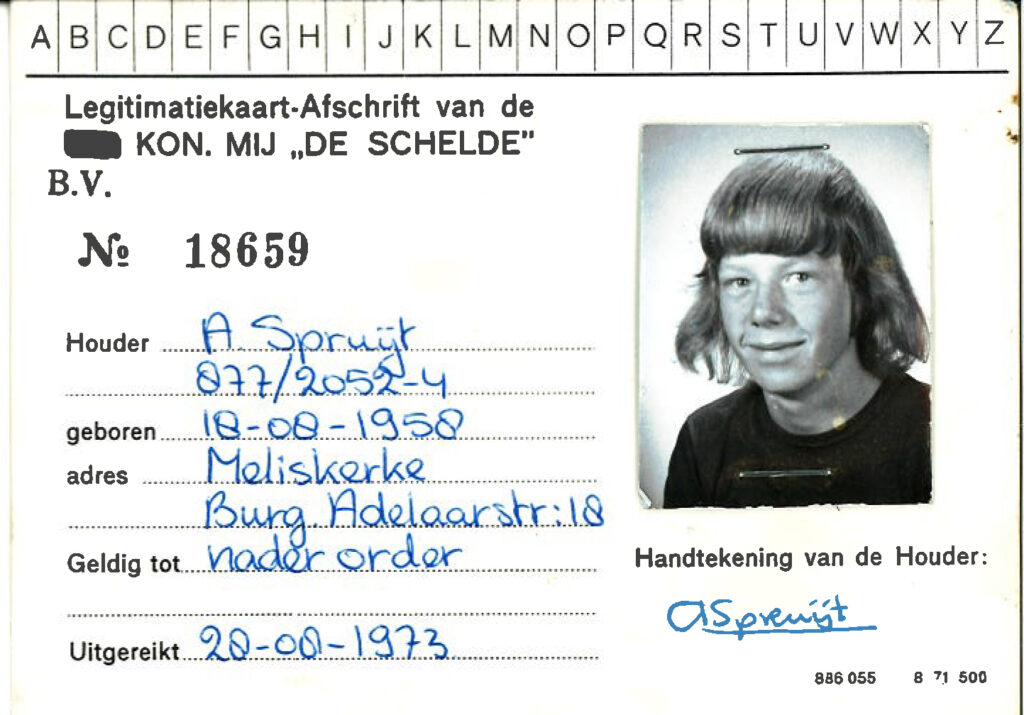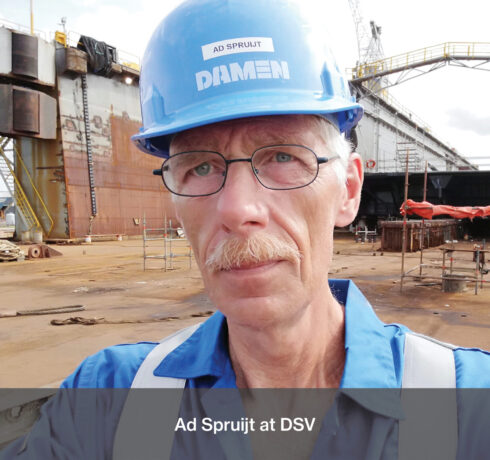He is responsible for all the maintenance activities at Damen Shiprepair Vlissingen’s extensive site; whether it is about a toilet that does not flush or a gigantic dock door that has seized. Ad Spruijt is Maintenance Coordinator at DSV. “There is always something to do and that is what makes the work so varied,” he says. Ad had already had a long career at De Schelde when he started working in DSV’s Maintenance Department in 2002. He was barely fifteen years old when he started at the company school in 1973, where he was trained as a turner. “Four days a week to school, and one day for theory lessons at the Streekschool in Middelburg,” he still remembers.
“You were picked up by bus and taken to work. I believe that De Schelde had fifteen company buses that picked up employees in the morning from various places in Zeeland and brought them home after work in the evening.” His first paycheck was literally handed over to him in an envelope. “It contained about nine hundred guilders.” In the 1980s, in order to develop his skills further, he enrolled for a four-year PBNA Mechanical Engineering course, which eventually earned Ad a promotion. In 1991, at the age of thirty, he was appointed head of the machining department.
 Ad Spruijt's De Schelde ID pass that he received when he was hired in 1973 at the age of fourteen.
Ad Spruijt's De Schelde ID pass that he received when he was hired in 1973 at the age of fourteen.
The period up to the end of the nineties was a turbulent time for the Machinefabriek, with several reorganisations. “With every reorganisation, the team got smaller again,” Ad recalls. At the end of 1999, when he was in danger of losing his job, he was able to transfer to Scheldepoort, where they needed someone to manage the machine bank workers. “My dismissal was reversed and I could start there right away; I was very lucky. It was a moment of change; in the Machinefabriek, I had worked all those years within the space of four walls. Now I suddenly going on board moored or docked ships with a team of workers to carry out repairs. It was a completely different job.”
In 2002, Ad was out of circulation for six months due to a serious illness, but after “healing miraculously” he went back to work on a therapeutic basis for half days at the Scheldepoort’s Maintenance Department. “I was still officially head of the machining department, but when my manager Hans van Veenendaal retired, they asked me if I wanted to carry on with this line of work. I said yes because it was going well – and that is actually how I got involved. It is extremely varied work. You have to remember that the Scheldepoort was built in 1963. A lot of the equipment and installations are also from that time and you have to consider that parts are always subject to wear-and-tear or rust. Having saltwater so close only enhances that process.”
"From day one, I cycled there from my village Meliskerke, and I still do."
He has fond memories of the roofing of the massive Dock 2, which took place in 2003. In 2010, the new DSV office was attached to that roof. “The old office, which stood where the parking lot now is, was then demolished. There is now a good connection between the new office and Dock 2 via the washing and changing rooms. Offices have also been created under part of the roof. Ad will take early retirement in September. He will not get bored: “I get to spend more time with our grandson Sebastiaan, who my wife and I now look after one day a week. And for my hobbies such as motorcycling; and maybe we will take the camper out more often.”
Ad also hopes to go to motocross events with his son Kevin more often; father and son share a passion for motocross, and Kevin participates in the sport himself. “But I still enjoy going to work. From day one, I cycled there from my village Meliskerke, and I still do. I must have covered some 57,000 kilometres in all those years. I will miss the sense of unity with my colleagues though. Finishing work on a ship, and everyone working together to achieve that – that is a mentality that I have always experienced as very positive.”

